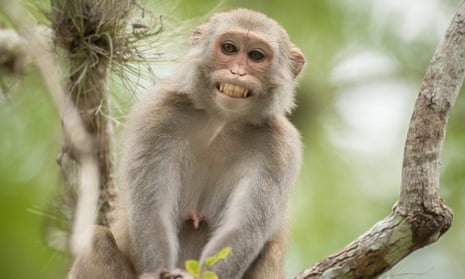China’s 1.5m-man military has recruited a troop of monkeys to help it clear the skies over Beijing before a massive parade designed to showcase the country’s growing might.
Senior Communist party leaders and world leaders, including the Russian president, Vladimir Putin, will gather in Tiananmen Square on Thursday to watch a procession of tanks, missile launchers and about 12,000 soldiers.
Overhead about 200 aircraft will perform fly-bys and manoeuvres, including in-flight refuelling, displaying China’s “aerial prowess”.
Chinese air force chiefs have looked to nature to help protect their state-of-the-art planes from potentially dangerous bird strikes.
Five rhesus monkeys – which are native to Asian countries including China, India and Bangladesh – have been called up to help destroy nests that could be used as staging posts for avian assaults on jets.
“Our original anti-bird method of using monkeys is a low-cost, low-risk and highly efficient method,” Han Bing, the political commissar of a military airstrip where the technique has been perfected, told the Beijing News. “It’s the first in the world.”
Air force officials started using monkeys to clear bird nests from trees last April, giving all “anti-bird team” macaques three months training, the newspaper reported.
Ma Junliang, an official from the team, told the Beijing Times the animals had been “conditioned” to follow orders to destroy nests.
China’s 398,000-strong air force was using only male monkeys because they were more “active” and easier to train, Ma said.
The perils of bird strikes were underlined last month when a Dallas-bound American Airlines Dreamliner was forced to return to Beijing after being hit shortly after takeoff.
Wang Mingzhi, another anti-bird official, said monkeys could go where man could not.
“No one can climb trees as tall as 30 metres,” Wang said, the South China Morning Post reported.
“With shotguns, we can blow off only two nests with a box of bullets. If we use water cannon, it would be a waste of water and human resources.”

Comments (…)
Sign in or create your Guardian account to join the discussion